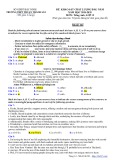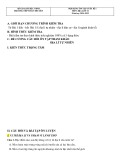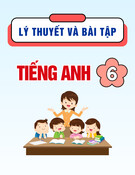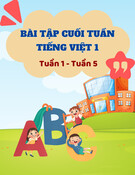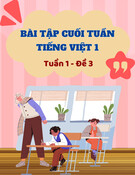SỞ GIÁO DỤC VÀ ĐÀO TẠO HÀ NỘI NỘI DUNG ÔN TẬP HỌC KÌ I
TRƯỜNG THPT TRẦN PHÚ-HOÀN KIẾM Môn: Tiếng Anh
Lớp : 12
Năm học: 2023-2024
PHẦN I: I. UNITS: 1-2 II. PHONETICS:
The pronunciation of the endings “s” and “ed” Stress in two-syllable Stress in three-syllable words Stress in more than three-syllable words • • • •
Simple, compound and complex sentences
III. GRAMMAR • Tenses • Definite and indefinite articles • The subjunctive • • Relative Clauses
IV. VOCABULARY:
• Words and phrases related to people’s life stories, urbanisation and its features. • Word formation: Compound adjectives.
V. FORM: 60- minute test- 50 questions. 1. Pronunciation + Stress (2 + 2 câu): 0.8 điểm 2. Vocabulary + Grammar (15 câu) (MCQ): 3 điểm 3. Closest + Opposite meaning(2 + 2 câu): 0.8 điểm 4. Error correction (3 câu): 0.6 điểm 5. Conversation(2 câu): 0.4 điểm 4. Reading: - Reading comprehension 1 (5 câu)– (MCQ): 1 điểm - Reading comprehension 2 (5 câu)– (MCQ): 1 điểm - Cloze test (5 câu): 1 điểm 5. Writing:
- Choose the sentence that is closet in meaning(3câu) - (MCQ): 0.6điểm - Choose the sentence thatthebest combines each pair of sentences (4câu) - (MCQ): 0.8
điểm
VI. SAMPLE TEST PRACTICE TEST 1
Mark the letter A, B, C, or D on your answer sheet to indicate the word whose underlined part differs from the other three in pronunciation in each of the following questions.
Question1. A. wave B. plan Question2. A. kits B. dates C. clap C. eats D. hand D. days
Mark the letter A, B, C, or D on your answer sheet to indicate the word that differs from theother three in the position of primary stress in each of the following questions. D. enjoy Question3. A. reduce B. aware D. employment Question4. A. customer B. company C. narrow C. influence
D. of/ in C. on/ with
D. which C. whose
B. had moved/ are D. moved/ are being
D. would fail C. will fail
D. optimist C. optimistic
B. can often considered D. can often consider
C. setting D. to set
C. could be D. was
C. biology D. biologically
C. is cooking D. cooks
C. join D. shake
B. not entering C. not to enter D. to not enter
C. paid D. took
C. A – a D. A – Ø Mark the letter A, B, C, or D on your answer sheet to indicate the correct answer to each of the following questions. Question5. David left high school____ the age ______ seventeen. A. at/ of B. in/for Question6.The lady________design had been chosen stepped to the platform to receive the award. A. whom B. that Question7. We_________here in 1993. We_________ here for a long time now. A. moved/ have been being C. moved/ have been Question8. If you don’t try to study harder, you _________ the next exam. A. will pass B. can’t fail Question9. Someone who is ____ is hopeful about the future or the success of something in particular. A. pessimistic B. pessimist Question10. Education ______ to be the most important element to develop a country. A. often be considered C. can often be considered Question11. On July 20, 1969, Neil Armstrong became the first person ____ foot another celestial body. A. set B. who was set Question12. If it _______warm yesterday, we would have gone to the beach. A. were B. had been Question13. He has been very interested in doing research on ___ since he was at high school. A. biologist B. biological Question14. When she came home from school yesterday, her mother ______ in the kitchen. A. cooked B. was cooking Question 15. It is parents’ duty and responsibility to ___________ hands to take care of their children and give them a happy home. A. give B. hold Question 16. The monk insisted that the tourists ____ the temple until they had removed their shoes. A. not enter Question 17. Although it was more than an hour late, the superstar finally showed up and ____ the attention of the audience. A. grabbed B. held Question 18. ____ Gordons is a very interesting family. They like to travel around ____ world. A. A – the B. The - the Question 19. The kids show some hatred towards him ____ he was really nice to them.
C. unless D. even though
B. indifferent C. interested D. negligent
A. because B. before Mark the letter A, B, C, or D on your answer sheet to indicate the word(s) CLOSEST in meaning to the underlined word(s) in each of the following questions. Question 20. He was attentive as Betsy and I talked about our charity concert to help the victims of the recent floods. A. perceptive Question21: My father hit the roof when he found that I’d damaged the car. A. Was over the moon C. went with the flow B. burst with anger D. kept his shirt on
D. temporally B. hesitantly C. certainly
Mark the letter A, B, C, or D on your answer sheet to indicate the word(s) OPPOSITE in meaning to the underlined word(s) in each of the following questions. Question 22. The police have concluded tentatively that the explosion was caused by a bomb. A. differently Question 23: The palace was badly damaged by fire, but was eventually restored to its original splendor. A. refurbished B. devasted C. strengthened D. renovated
Mark the letter A, B, C, or D on your answer sheet to indicate the option that best completes each of the following exchanges. Question 24. Long: I didn’t know you could play badminton so well, Tram. Tram: Thank you, Long, ________________. I wish I could play half as well as you, Long. B. That is not your fault A. That’s a nice compliment C. You’re welcome D. I play very excellently. Question 25. Sam: “Would you like to have dinner with me?” Susan: “___________” A. Yes, it is C. I’m very happy B. Yes, I’d love to D. Yes, so do
Read the following passage and mark the letter A, B, C, or D on your answer sheet to indicate the correct word or phrase that best fits each of the numbered blanks from 26 to 30. Nearly 450.000 businesses are started in Britain every year. One-third of these stops trading during the first three years. Starting a business is never easy (26)_______ so many things are outside your control. If you are thinking about working for yourself, you must start by thinking about the qualities you need to (27)______a business. Be hard with yourself. If you have a weakness, it is better to find out now rather than later (28)________ your business could be in danger. Ask yourself whether you are a good (29)______. Is your health good? Are you good at making decisions? Do you have any practical experience of the business you want to start? Are you prepared to work long hours for very (30)_______money? If you cannot answer 'yes' to most of these questions, perhaps you should think again about starting up in business on your own.
Question 26. A. because B. but C. however Question 27. A. set B. make C. let Question 28. A. who B. that C. which Question 29. A. organizing B. organizer C. organization Question 30. A. little B. short C. few D. although D. run D. when D. organize D. much
Read the following passage and mark the letter A, B, C, or D on your answer sheet to indicate the correct answer to each of the questions from 31 to 35. Elizabeth Rosemond Taylor was born on February 27, 1932, in London, England. One of film's most celebrated stars, Elizabeth Taylor has fashioned a career that's covered more than six decades, accepting roles that have not only showcased her beauty, but her ability to take on emotionally charged characters. Taylor's American parents, both art dealers, were residing in London when she was born. Soon after the outbreak of World War II, the Taylors returned to the United States and settled into their new life in Los Angeles. Performance was in Taylor's blood. Her mother had worked as an actress until she married. At the age of 3, the young Taylor started dancing, and eventually gave a recital for Princesses Elizabeth and Margaret. Not long after relocating to California a family friend suggested the Taylors' daughter take a screen test. She soon signed a contract with Universal Studios, and made her screen debut at the age of 10 in There's One Born Every Minute (1942). She followed that up with a bigger role in Lassie Come Home (1943) and later The White Cliffs of Dover (1944). Her breakout role, however, came in 1944 with National Velvet, in a role Elizabeth Taylor spent four months working to get. The film subsequently turned out to be a huge hit that pulled in more than $4 million and made the 12-year-old actress a huge star. Question 31. Which of the following is NOT true about the Taylors? A. Her mother used to be an actress before getting married. B. They lived in London at Taylor’s birth. C. They were originally American. D. Not until Taylor grew up, her family encouraged her to start with art. Question 32. The word ‘fashioned’ in the passage is closest in meaning to ________. A. adapted B. ended C. shaped D. changed Question 33. Taylor _________________________. A. only accepted the roles to show her beauty B. gave a performance to the royal when she was small C. had some roles when she was at the age of 3 D. moved to Los Angeles when World War II broke out. Question 34. The word ‘that’ in the passage refers to __________. A. the age of ten B. There's One Born Every Minute C. Universal Studios D. the contract Question 35. Her role in National Velvet ____________________. A. marked the first enormous success of Taylor B. didn’t help to make a huge amount of money C. took her little time of working D. was taken when she was old
Read the following passage and mark the letter A, B, C, or D on your answer sheet to indicate the correct answer to each of the questions from 36 to 42.
Back in 1853, at the age of 24, Levi Strauss opened a west coast branch of his brother's dry goods business in New York.Over the next twenty years, he built his business into a lucrative operation.
One of Levi's customers was a tailor by the name of Jacob Davis. Originally from Latvia, Jacob lived in Reno, Nevada, andregularly pur-chased bolts of cloth from Levi Strauss & Co. Among Jacob's customers was a man who kept ripping thepockets on the pants that Jacob made for him. Jacob tried to find a way to strengthen his customer's pants
when, one day, itfinally occurred to him. He decided to put metal rivets on the pocket corners and at the base of the button fly. It worked andthe pants became an instant success.
B. He didn't know how to
D. He knew Levi had the
B. Levi moved to the west
D. Levi started working
He was Levi's B.
D. He was Levi's tailor.
B. because his business
D. because Jacob was a
B. applied for a patent
got first their D.
Jacob knew he had discovered something new and worried that someone might steal his idea. That's why he decided toapply for a patent, but he didn't have the $68 that was required for the paperwork. So, he turned to Levi Strauss. He wrotehim a letter suggesting that they hold the patent together. Being the businessman that he was, Strauss agreed immediatelyseeing the potential for this new product. So, on May 20, 1873, the two men received patent number 139,121 from the USPatent and Trademark Office and went into business together. That was the day blue jeans were born. Who would havethought back then that denim, thread and a little metal would become the most popular clothing product in the world and it'sall thanks to two men - Levi Strauss and Jacob Davis. Question 36. According to the passage, why did Jacob write to Levi? A. He didn't have the necessary funds to get a patent. apply for a patent. C. He had no one else to turn to. right connections. Question 37. Which of the following titles best summarizes the content of the passage? A. The Beginning of a Successful Partnership B. The History of Jeans C. How Jeans Were Invented D. The Lives of Levi Strauss and Jacob Davis Question 38. According to the passage, what happened in 1853? A. Levi set up a business with his brother. coast. C. Levi became a successful businessman. on his own. Question 39. What is true about Jacob Davis? A. He was Levi's friend. customer in Latvia. C. He was Levi's business partner Question 40. Why did Jacobput metal rivets on the pants he made? A. because his customers asked for it B. because he wanted to prevent something from happening C. because it was fashionable D. because he wanted to do something different Question 41. Why did Levi accept Jacob's offer? A. because he knew it would pay off was in trouble C. because he was looking to expand his business good customer Question 42. In 1873, Levi and Jacob...... . A. founded their first company. number. C. made their first blue jeans. customers. Mark the letter A, B, C, or D on your answer sheet to indicate the underlined part that needs correction in each of the following questions. Question 43. Because (A) his sickness, he (B) didn’t take (C) part in the English competition held (D) last Sunday.
Question 44.In order to (A) avoid to make (B) mistakes, take (C) your time and work carefully(D). Question 45. They asked me how long(A) did it take (B) to get to (C) Paris by train(D).
B. I'll never let you down. D. I'll never make you down.
Mark the letter A, B, C, or D on your answer sheet to indicate the sentence that is closest in meaning to each of the following questions. Question 46. Rapid ups and downs in the number of students could be observed in June. A. The number of students changed dramatically in June. B. The number of students did not stay the same in June. C. The number of students fluctuated wildly in June. D. The number of students went up and then fell in June. The rapid urbanization led to many serious problems. One of those is the growth of slums. A. The rapid urbanization is the cause of many serious problems such as the growth of slums. B. The rapid urbanization is consequent of many serious problems like the growth of slums. C. The rapid urbanization is created by many serious problems such as the growth of slums. D. The rapid urbanization is resulted by many serious problems like the growth of slums. Question 48. You can always count on me. A. I'll never take you down. C. I'll never hold you down. Question 47. He doesn't like going out. He doesn't invite any friends home. A. He either goes out or invites any friends home. B. He neither goes out nor invites any friends home. C. He not only goes out but also invites any friends home. D. He goes out but not invites any friends home.
Mark the letter A, B, C, or D on your answer sheet to indicate the sentence that best combines each pair of sentences in the following questions. Question 49. The guest on our show who has won the Opera. He is the youngest professional golfer that has won this award so far. A. The professional golfer who has won the Opera so far is the youngest guest on our show. B. The youngest professional golfer won the Opera so far is the guest on our show. C. The youngest guest on our show is the professional golfer winning the Opera so far. D. The guest on our show is the youngest professional golfer to win the Opera so far. Question 50: We arrived at the conference. Then we realized that our reports were still at home. A. No sooner had we realized that our reports were at home than we arrived at the conference. B. Only after we arrived at the conference did we realize that our reports were still at home. C. Not until we arrived at the conference that we realized that our reports were still at home. D. Hardly had we arrived at the conference that we realized that our reports were still at home.
PHẦN II: I. UNITS: 1-5 II. PHONETICS:
The pronunciation of the endings “s” and “ed” Stress in two-syllable Stress in three-syllable words Stress in more than three-syllable words • • • •
Simple, compound and complex sentences
III. GRAMMAR • Tenses • Definite and indefinite articles • The subjunctive • • Relative Clauses Prepositions • • Repeated comparatives
IV. VOCABULARY:
• Words and phrases related to people’s life stories, urbanisation and its features, advantages and disadvantages of a green lifestyle, the mass media, cultural identity. • Word formation: Compound adjectives.
V. FORM: 60- minute test- 50 questions. 1. Pronunciation + Stress (2 + 2 câu): 0.8 điểm 2. Vocabulary + Grammar (15 câu) (MCQ): 3 điểm 3. Closest + Opposite meaning(2 + 2 câu): 0.8 điểm 4. Error correction (3 câu): 0.6 điểm 5. Conversation(2 câu): 0.4 điểm 4. Reading: - Reading comprehension 1 (5 câu)– (MCQ): 1 điểm - Reading comprehension 2 (5 câu)– (MCQ): 1 điểm - Cloze test (5 câu): 1 điểm 5. Writing:
- Choose the sentence that is closet in meaning(3câu) - (MCQ): 0.6điểm - Choose the sentence thatthebest combines each pair of sentences (4câu) - (MCQ): 0.8
điểm
VI. SAMPLE TEST PRACTICE TEST 1
MarktheletterA,B,C,orDonyouranswersheettoindicatethewordwhoseunderlinedpartdiffers fromthe other three in pronunciation in each of the followingquestions.
Question 1. A. complexion Question 2. A. student B. examination B. statue C. exaggerate C. situation D. exhibit D. actually
Mark the letter A, B, C, or D on your answer sheet to indicate the word that differs from the other three in the position of primary stress in each of the following questions.
Question 3. A. associate Question 4. A. misfortune B. dioxide B. illegal C. dedicate C. indifference D. cosmetic D. discotheque
D. work B.beworking C.haveworked
D. stands up B.comes round C.pulls through
B. Only C. Apart D.Separate
B.created C.caused D. made
D. metre B. mile C. foot
D. verymuch C. much too
D. patrol C. cover
D. across C. on B.at
D. as though B.so C. if
Mark the letter A, B, C, or D on your answer sheet to indicate the correct answer to each of the following questions. Question 5. Shemust in the garage when we came. That’s why she didn’t hear thebell. A. have been working Question6.It’saseriousoperationforawomanasoldasmygrandmother.She’sveryfrail.Ihopeshe . A.gets on Question 7. from Tim, all the students said they would gocamping. A.Except for Question 8.Hehas a valuable contribution to the life of theschool. A.done Question 9. No matter how much pressure you put on your husband, he won’t budgea(n) A.inch Question 10. The test was not very difficult, butit was long. A.too much B.somuch Question 11. Policemen aresometimes on at night. A.force B.alert Question 12. He thinks that I wastoo friendly the applicants. A.with Question 13. How can thebossact nothing hadhappened? A.therefore Question 14. Ifyourun Tom, give him my bestwishes. A.over C. into D. to B.up
C.cash D. cost B. supply
B.Only C. Not until D. Just before
B. with D. over C. for
B. where C.when D. who
B.character C. being D. role
Question 15. I gave the waiter a $100 note and waitedformy . A.change Question 16. she phoned me did I remember theappoinment. A.Nosooner Question 17. I think heisup thejob. A.to Question 18. The manager will reply to alltheletters are sent tohim. A.that Question 19. My mother thought that his action was ratheroutof . A. personality Mark the letter A, B, C, or D on your answer sheet to indicate the word(s) CLOSEST in meaning to the underlined word(s) in each of the following questions. Question 20. Some ethnic groups have strange customssuch as walking on fire to prevent natural disasters.
B. accepted ways of doingsomething D. ideas about doingsomething
C. futile B.dangerous
B.bepessimistic C.beconfident D. besmart
D. understanding B.disobedient C.obedient
B. The meal was out of thisworld D. Of coursenot
A. methods fordoingsomething C. skills ofdoingsomething Question 21. During the war, the shipping lanes proved vulnerableto be attacked. D. feasible A.susceptible Mark the letter A, B, C, or D on your answer sheet to indicate the word(s) OPPOSITE in meaning to the underlined word(s) in each of the following questions. Question 22. My brother tends to look on the bright sidein any circumstance. A.beoptimistic Question 23. He was so insubordinatethat he lost his job within a week. A.arrogant Mark the letter A, B, C, or D on your answer sheet to indicate the option that best completes each of the following exchanges. Question 24. Marry is talking to Linda over the phone. Mary: "Thank you for helping me prepare for the party.” Linda:" " A.Mypleasure C. Nevermentionme Question 25. Linh is going to hold her birthday party at home this Sunday, so she wants to invite some of her friends to attend the party. Linh: "I would like to invite you to my party this Sundayevening.” Huy: " ."
A. Thank you for your offer, but I think it isunnecessary. B. I would love to come but I have prior commitments. I’msorry. C. I am sorry. Can you come to myplace? D. How about going to thecinema?
anyone, support of a themselves may have
ReadthefollowingpassageandmarktheletterA,B,C,orDonyouranswersheettoindicatethecorr ectword or phrase that best fits each of the numbered blanks from 26 to30. Therearemanyaspectsthatareinvolvedintakingcareofelderlyoragedpeople.Those(26) have the responsibility of taking care of the aged need tobe(27) of the various needs and requirements that the elderly have. Elderly individuals who live on their own, without certain the amountoffinancialneeds.Suchpeopleneedtofend(28) for everything, including food, groceries, medicines etc. Pensioners have the benefit of a steady source of monthly income. Those who do not haveany(29) or other source of income would have to live entirely on their savings or through special senior citizens’ government financial schemesor (30) from charitable organisations. (Adapted from http://www.englishdaily626.com)
Question 26. A. who Question 27. A. know Question 28. A. of Question 29. A. finance Question 30.A.benefits B. whom B. understand B. for B. fees B.management C. which C. aware C. with C. expense C. donations D. when D. learn D. to D. pension D.interference
Read the following passage and mark the letter A, B, C, or D on your answer sheet to indicate the correct answer to each of the questions from 31 to 35. For recent graduates, internships may become a stepping stone to full-time, paid
Before accepting anoffertoworkasanintern youshouldgetsome
B. Company’s reputation of hiring
D. Internshipsalary.
B. It offers higher salary. D. It offers full-time position.
B. To get information about job
D. To maintain good relationship with
employment. informationaboutthecompany’sreputationofprocuringtheir internsanddecideaccordingly.Iftheyusuallyhireoneinternbuthavetensofemployeesworkingda yandnight, itisbettertolookforothercompanies.Thebestplacetohaveaninternshippositionisanorganizatio nthatgives you an opportunity to gain real work experience and develop your skills instead of using you as a cheapworker. Another thing that should be considered is the size of the company. Sometimes bigger and more established organizationsarebetterastheyhavea clearhierarchyandthereforeitgives youaclearideaof yourpositionand the job description and most importantly, it will be easier to get a mentor. Startups with only five employees are usually more flexible in terms of job responsibilities and therefore it makes it harder to define your position and getmentors. After you choose a company, do a little research on the company including the people who work there. You can do a Google search and comb social media such as LinkedIn, Facebook and Twitter to dig deep about the company’s hiring managers and what they expect from a new employee. Socialmediaisalsoveryusefultokeepintouchwithasmanypeopleasyoucanandbuildyournetwor k.Donot hesitate to maintain any personal connection you have because those connections could be the first ones who inform you about a new job opening or any vacant positions you can applyfor. If you aim for a dream job, do not overlook an entry-level position just because it offers mediocre salary. Entry- level employees are more likely to be given room to grow and learn from their mistakes. They will also be able to figure out the job routines and get used to them when they actually get the position they have been dreaming about. As your first few jobs might be very demanding yet less rewarding, remember to have fun and enjoy your life. Working overtime may not always be a good idea to accelerate your career, especially if you have to be more stressed than your seniors who earn bigger salaries. Setting the time for exercise and social life will make your life more balanced and stress free. Question 31. What should a fresh graduate take into account when finding an internship? A. Company’s recruitment procedure. interns. C. Company’sworker union. Question 32. Why is a more established organization a better place to work as an intern? A. It has flexible work hours. C. It has clear job descriptions. Question 33. What are the recommended media for doing research on the company? B. Google search, Twitter, Yahoo A. Google search, Facebook, LinkedIn D. Google scholar, LinkedIn, Twitter C. Google search, Twitter, Gmail Question 34. Why is networking important for recent graduates? A. To get information aboutjobopenings. security. C. To keep in touch withanex-employer. fellow interns. Question 35. What is the advantage of taking an entry-level position? A. Gettingmediocresalary. C. Understandingcompany’spolicy. B. Gettingpromotion. D. Understanding jobroutines.
the and order
Read the following passage and mark the letter A, B, C, or D on your answer sheet to indicate the correct answer to each of the questions from 36 to 42. There’s no place in the world quite as famous for its culture as the island kingdom of Great Britain. With over two thousand years of culture from which to draw, the nation and its people celebrate weddings with a uniquely elegant sense of poise and class. Abride’sweddingdayisoftentoutedas"thehappiestdayofherlife”,butinallhonestyit’softenaver ystressful experienceastherearelotsofconventionssurroundingthewholethingandyoucangetcaughtupinf amilyrows, and trying to please everyone. Still it’s a good test of a couple’scourage. When the guests arrive for a wedding the ushers’ duty is to hand out the correct books, of flowers service,andensuretheguestsareseatedinthecorrectplaces.Traditionally,thesideonwhichpeople sitdepends onwhethertheyarefriendsorfamilyofthebrideorofthegroom.Thefrontrowsaregenerallyreserv edforclose family or friends, with the very first seats reserved for the bridal party. However, in many ceremonies the bridal party will remain standing at the altar during the ceremony along with the bride and groom. Duringtheceremonythebrideandgroommaketheirmarriagevows.Marriagevowsarepromisesa couplemakes to each other during a wedding ceremony. In Western culture, these promises have traditionally included the notions of affection, faithfulness, unconditionality, and permanence. Most wedding vows are taken from traditional religious ceremonies, but nowadays in the UK many couples choose touching love poems or lyrics from a love song revised as wedding vows and some couples even choose to write their own vows, rather than relying on standard ones spoken by the celebrant. After the vows have been spoken the couple exchange rings. The wedding ring is placed on the third finger of the left hand, also called the “ring" finger. The wedding ring is usually a plain gold ring. After the wedding ceremony, the bride, groom, officiant, and two witnesses generally go off to a side room to sign the wedding register. Without this the marriage is not legal and a wedding certificate cannot be issued. Question 36. What does the passage mainly discuss?
A. The bride’s and groom’s vows in the UnitedKingdom. B. Traditional wedding ceremony in the UnitedKingdom. C. The happiest day in the UnitedKingdom. D. Typical features of British cultures
Question 37. According paragraph 2, the couple can get stressed on theirweddingday .
A. as there are lots of conventions between the bride and thegroom. B. due to traditional customs during and after the weddingceremony. C. because the newly-wedded couple have to take a test ofcourage. D. since the surroundings discourage thecouple.
B. guests C. books D. marriedcouples
Question 38. The word "they" in paragraph 3refersto . A.ushers Question 39. The word "vows" in paragraph 4 is closest in meaning to
A.promises C.compromises B.agreements D.arguments
Question 40. In a British traditional wedding, the places where theguestssit .
C. the couple’sown wows the D.
A. are conditional on their relationship to thecouple B. are seated by thecouple C. depend on whether their friends or family arestanding D. at the altar during the ceremony along with the bride andgroom. Question 41. According the passage, nowadays what can be replaced traditional wedding vowsEXCEPT? A. touchinglove poems B. lovesonglyrics celebrant’swows Question 42. The wedding certificate willbe issued . A.untilthebrideandgroomgoofftoasideroom
B.assoonasthecouplelegalizetheirweddingregister. C. after the bride and groom exchange theirweddingrings. D. right after the signs of marriage are not legal. Mark the letter A, B, C, or D on your answer sheet to indicate the underlined part that needs correction in each of the followingquestions. Question 43. Viet Nam Airlines regrets (A) informingpassengers (B) thatflight VN 541 to Ho Chi Minh City is (C) postponed (D) due tobad weather. Question 44. Mrs. Brown, who (A) wasso proud of her new car, (B) droveto work when the accident (C) happenedand (D) damagedher car. Question 45. Snapping turtles are (A) easilyrecognized (B) because ofthe large head, the long tail and the shell that seems (C) insufficiently (D) to protectthe body. Mark the letter A, B, C, or D on your answer sheet to indicate the sentence that is closest in meaning to each of the following questions. Question 46. I’m sorry. I didn’t do my homework." Huyen said to her teacher.
A. Huyen said to her teacher she is sorry because she doesn’t do herhomework. B. Huyen forgets to do her homework and she says sorry to herteacher. C. Huyen apologized to the teacher for not doing herhomework. D. Huyen feels sorry for not doing myhomework.
Question 47. However hard Tim tried to win the contest, he didn’t succeed. A. No matter how hard Tim tried to win the contest, he didn’tsucceed. B. Tim tried to win the contest andsucceeded. C. Although Tim tried hard to win the contest but he didn’tsucceed. D. It was hard for Tim to win the contest because he neversucceeded.
Question 48. You needn’t have bought too much food. A. It is not necessary for you to buy too muchfood. B. You bought too much food, which was notnecessary. C. You have bought too much food that I don’tneed. D. There is no need for you to buy too muchfood.
Mark the letter A, B, C, or D on your answer sheet to indicate the sentence that best combines each pair of sentences in the following questions. Question 49. I went to the supermarket. I wanted to buy food for the whole week. A. The food for the whole week was not enough so I went to thesupermarket. B. In order to go to the supermarket, I wanted to buy food for the wholeweek. C. I went to the supermarket to buy food for the wholeweek. D. For the food to be bought for the whole week, I went to thesupermarket.
Question 50. Drinking wine is a very bad habit. You had better get rid of it immediately.
A. You should get rid of the habit of drinking wine immediately and you will see how bad itis.
B. Because drinking wine is a very bad habit, you should get rid of itimmediately. C. Stop drinking wine and it will soon become your badhabit. D. If you stop drinking wine immediately, it will have a bad effect on yourhealth.
PRACTICE TEST 2
MarktheletterA,B,C,orDonyouranswersheettoindicatethewordwhoseunderlinedpartdiffers fromthe other three in pronunciation in each of the followingquestions.
Question 1. A. orchestra Question 2. A. confine B. chasm B. conceal C. chemical C. convention D. orchard D. concentrate
Mark the letter A, B, C, or D on your answer sheet to indicate the word that differs from the other three in the position of primary stress in each of the following questions.
Question 3. A. individual Question 4. A. popularity B. expenditure B. laboratory C. communicate C. politician D. necessity D. documentary
C. exert D. resort B.recourse
C.narrow-minded D.absent-
D. to believe
D. to stand B. stood C. stand
C. shedidrefuse B. didsherefuse when D.
C. the largest of which D. B. thelargest one the larger
Mark the letter A, B, C, or D on your answer sheet to indicate the correct answer to each of the following questions. Question 5. No matter how angry she was, shewouldnever to violence. A.resolve Question 6. She refuses to even listen to anyone else’s point of view. Sheisvery . A.open-minded B.kind-hearted minded Question 7. Iam inclined his complicity in the bigfraud. C. forbelieving B. in believing A. aboutbelieving Question 8. Do you knowthewoman next to ourteacher? A.standing Question 9.Not only to speak to him, but she also vowed never to see himagain. A.sherefused sherefused Question 10. In my small house there aretwo rooms, is used as theliving-room. A. thelargeone ofwhich Question 11. Luckily, by the time we got there,thepainting .
D. hadn’t been B.hadn’tsold C.wasn’tsold
C.at hand D. out of hand
B.givingoff C.givingup D.
A.didn’tsell sold Question 12. She applied for paid leave but her boss rejectedherapplication . B.on hand A.in hand Question 13. What is this?Itis a horriblesmell. A.givingdown givingout Question 14. We have had the roof ofourhouse . A.toreplace C.beenreplaced B.replace D.replaced
Question 15. They are goingto have trip to Ha Long Bay nextmonth. A. atwo-day C.twodays’ B.two-days D. atwo-day’s
Question 16. It’s not so much her looks Idon’t like her inability tolisten. A.as than C. B.more D. for
Question 17. Sheis to leave as soon aspossible. A.cautious C.worried B.anxious D. nervous
Question 18. Despite being a very good student, she didn’tfulfillher _ later in life. A.making capacity C. B. potential D. aptitude
C. discussion D. surveillance B.consideration
D. wasn’thappy C. didn’tcare
C.confined D. unique B.clean
gave D. Question 19. He was not aware that he hadbeen under since hisarrival. A.review Mark the letter A, B, C, or D on your answer sheet to indicate the word(s) CLOSEST in meaning to the underlined word(s) in each of the following questions. Question 20. Hedidn’t bat an eyewhen he realized he failed the exam again. B. didn’t wanttosee A. didn’tshowsurprise Question 21. Your room is so cluttered. You should tidy it up immediately. A. messy Mark the letter A, B, C, or D on your answer sheet to indicate the word(s) OPPOSITE in meaning to the underlined word(s) in each of the following questions. Question 22. At first, no one believed he was a pilot, but his documents lent colour tohisstatements. A. provided evidence for B. gotinformationfrom C. borrowedcolour from no proofof
D. B. verybored C. veryscared
B. Yes, you can useit. D. Yes, It’s allright.
B. It’s much toohigh. D. No. The line isbusy.
particular person a
would make who a
Question 23. I’m sorry I can’t come to your birthday party this weekend - I’m up to my ears inwork. A.verybusy veryidle Mark the letter A, B, C, or D on your answer sheet to indicate the option that best completes each of the following exchanges. Question 24. Jenifer: "Would you mind if I use your computer for an hour?"-Tim:" ". A. Not at all. I’ve finishedmyjob. C. Of course not. I still needit now. Question 25. "Have you been able to reach Tom?”- " ” A. There’snoapproval. C. Yes. I’ve known himfor years. ReadthefollowingpassageandmarktheletterA,B,C,orDonyouranswersheettoindicatetheco rrectword or phrase that best fits each of the numbered blanks from 26 to30. Love is one of the most profound emotions known to human beings. There are many kinds of love, but many people seek its expression in a romantic relationship with a compatible partner (or partners). Formanypeople,romanticrelationshipscompriseoneofthemostmeaningfulaspectsoflife,provi dingasource of deep fulfillment. The need for human connection appears tobe(26) - but the ability to form healthy, loving relationships islearned. Someevidencesuggeststhattheabilitytoformastablerelationshipstartstoformininfancy,inachil d’searliest experienceswithacaregiverwhoreliablymeettheinfant’sneedsforfood,care,warmth,protection ,stimulation, andsocialcontact.Suchrelationshipsarenotdestiny,buttheyaretheorizedtoestablishdeeplyingr ainedpatterns of relating toothers. Failed relationships happen for many reasons, and the failure of a relationship is often a source great of psychologicalanguish.Mostpeoplehavetoworkconsciouslytomastertheskillsnecessarytomak erelationships endure andflourish. Finding a partner with whom to share a life is a wonderful - yet sometimes difficult -process.(27) it’s conducted online or in-person, the search will likely push an individual into unfamiliar settings to encounter potential partners. In order to be successful, it is often necessary to go outside one’s comfortzone. Dating is a process by which people spend time with others in order to gradually determine whether issuitable(28) apotentialmate.Determiningwhetheraconnectionreflects(29) infatuation or true love can sometimes be challenging, but research suggests that there are revealing clues in behavior. One possibly counterintuitive indicator of a potential match is one’s sense of self. goodpartnermaypush Someone early anindividualtodiscovernewactivitiesorbeliefsthatexpandtheirself-concept.Another (30)_ may be stress: repeatedly interacting with someone signifier
impression matters deeply to someone can fuelanxiety. Other indicators include being highly motivated to see the person and investing a significant amount of time, emotion, and energy into the budding relationship. (Adapted from: https://medium.eom/@souravraj.kumar19)
Question 26. A. innate Question 27. A. When Question 28. A. with Question 29. A. popular Question 30. A. which B. difficult B. Where B. like B. temporary B. that C. strong C. Whether C. since C. accessible C. whose D. lost D. If D. as D. available D. what
interest student loans rates are for
fees-some
Read the following passage and mark the letter A, B, C, or D on your answer sheet to indicate the correct answer to each of the questions from 31 to 35. Going to college or university in the United States is very expensive. A year at a prominent four-year university can cost almost $50,000, and this does not include the extra costs of housing, transportation, and other living expenses. There are, of course, less expensive options at colleges that also offer an excellent education. Most four- yearcollegescostatleast$10,000peryear,andmanymoreareinthe$20,000to$30,000range.Forfa milies intheUnitedStates,payingfortheeducationoftheirchildrenhasbecomeamajorexpense.Manyfa miliesbegin saving money from the time their children are born, and some states offer incentive plans for savingsprograms. As expensive as the tuition is, it should be noted that this hardly covers all the cost of providing education. an Buildings,equipment,andsalarycostsareincreasinglyexpensive,withadvancedtechnologyadd ingtremendous costs for laboratories and other specialized facilities. Universities and colleges constantly seek support from foundations, corporations, and industry, as well as from local, state, or federalgovernment. In addition to family funds and savings, there are two main types of funding for college: loans and grants.Loans are borrowed money that must be paid back, with interest, although the lower thanforsomeothertypesofloans.Theearlyyearsofmanyworkers’careersarespenttryingtopayba ckstudent loans.Grants,includingscholarships,aregiftsofmoneythatdonothavetobepaidback,butstudent softenmust fulfill certain obligations, such as maintaining a certain grade point average or demonstrating family need, in order to qualify. Scholarships are funds that are earned or competed for, and they may be based on the student’s academic, athletic, or civic performance or on some other condition that has been met by the student or family. Identifying and accessing these funds can be confusing, and even disheartening,for families when they encounter the application forms. Colleges, secondary schools, and other organizations have offices to help students learn about fundingresources. TuitionisonlythebeginningofthefinancialinvestmentrequiredforaU.S.education.Costsinclud eeducational arepaidbyeveryoneeachterm,othersarerelatedtothe coursesbeingtaken.Studentsmustalsopay for housing; books; other materials; meals; health insurance and health care; local day-to-day transportation, including parking; and transportation to and from home; telephone and Internet use; and any other expenses. Normally, international students pay the higher out-of-state tuition rate at publicinstitutions. Question 31. Which of the following is the best title of the passage?
A. The cost of college in the United States B. The advantages of going to college or university in the UnitedStates C. Types of funding for college in the UnitedStates D. Financial support from corporations or federal government for education in the UnitedStates
Question 32. Which of the following is TRUE according to the passage? A. Students at a prominent university spend about $50,000 per year on their study and livingexpenses.
B. Few four-year colleges cost at least $10,000 per year.
C. Studentsstudyingatcollegeswhichalsoofferagoodeducationpaymuchmoremoneythan thosestudyingat others.
D. Attending university in the United States iscostly. Question 33.Students must . A. repay student loans beforegraduation. B. have excellent academic performances or meet other requirements to winscholarships. C. pay very high interest on theirloans. D. fulfill certain obligations such as getting high grades to borrow money forcollege. Question 34. Which of the following is NOT mentioned in the passage? A. Student loans are money that is borrowed must be paidback. B. Most students in the United States don’t have to borrow money for their study because they arerich.
B.irritating C.discouraging D. embarrassing
late
C. Students must compete forscholarships. D. Students must also pay for housing, transportation or other livingexpenses. Question 35. The word "disheartening" is closest inmeaningto . A.dishonest Read the following passage and mark the letter A, B, C, or D on your answer sheet to indicate the correct answer to each of the questions from 36 to 42. Matching the influx of foreign immigrants into the larger cities of the United States during the nineteenth centurywasadomesticmigration,fromtownsandfarmstocities,withintheUnitedStates.Thecou ntryhadbeen overwhelminglyruralatthebeginningofthecentury,withlessthan5percentofAmericanslivingin largetowns or cities. The proportion of urban population began to grow remarkably after 1840, increasing from 11 percent that year to 28 percent by 1880 and to 46 percent by 1900. A country with only 6 cities boasting a population of more than 8,000 in 1800 had become one with 545 such cities in 1900. Of these, 26 had a population of more than100,000including3thatheldmorethanamillionpeople.Muchofthemigrationproducinganu rbansociety came from smaller towns within the United States, but the combination of new immigrants and old American "settlers" on America’s "urban frontier" in the late nineteenth century provedextraordinary. Thegrowthofcitiesandtheprocessofindustrializationfedoneachother.Theagriculturalrevolutio nstimulated many in the countryside to seek a new life in the city and made it possible for fewer farmers to feed the large concentrations of people needed to provide a workforce for growing numbers of factories. Cities also provided ready and convenient markets for the products of industry, and huge contracts in transportation andconstruction
aswellastheexpandedmarketinconsumergoods-
B. rural life D. famous cities of the twentiethcentury
B. Eleven percent D. Forty-sixpercent
D. motivated B.prepared C. limited
B.ruralAmericans D. cities C.farms
D. challenging B.comfortable C.attractive
allowedcontinuedgrowthoftheurbansectoroftheoverall economy of the UnitedStates. Technological developments further stimulatedthe process of urbanization. One example is the Bessemer converter (an industrial process for manufacturing steel), which provided steel girders for the construction of skyscrapers. The refining of crude oil into kerosene, and later the development of electric lighting as well as of the telephone, brought additional comforts to urban areas that were unavailable to rural Americans and helped attractmanyofthemfromthefarmsintothecities.Ineveryerathelureofthecityincludedamajorps ychological elementforcountrypeople:thebustleandsocialinteractionofurbanlifeseemedparticularlyintrig uingtothose raised in ruralisolation. Question 36. What aspects of the United States in the nineteenth century does the passage mainly discuss? A. Technologicaldevelopments B. The impact of foreign immigrants oncities C. Standards ofliving D. The relationship between industrialization andurbanization Question 37. The paragraph preceding the passage mostprobablydiscuss . A.foreignimmigration C. theagriculturalrevolution Question 38. What proportion of population of the United States was urban in 1900? A.Fivepercent C.Twenty-eightpercent Question 39. The word "stimulated"in the last paragraph is closest inmeaningto . A.forced Question 40. Why does the author mention "electric lighting” and "the telephone” the last paragraph? A. They contributed to the agriculturalrevolution B. They are examples of the conveniences of citylife C. They were developed by the sameindividual. D. They were products of the Bessemerconverter. Question 41. The word "them" in the last paragraphrefersto . A.urbanareas Question 42. The word "intriguing" in the last paragraph is closest inmeaningto . A.profitable Mark the letter A, B, C, or D on your answer sheet to indicate the underlined part that needs correction in each of the following questions. Question 43. (A) Manyof the population (B) inour country (C) is composed (D) offarmers. Question 44. (A) The morethe relative humidity reading (B) rises, (C) the worsethe heat (D) affectsus. Question 45. It is (A) disappointingthat (B) mosttourists who (C) cometo the country only visit the (D) samefewovercrowded places. Mark the letter A, B, C, or D on your answer sheet to indicate the sentence that is closest in meaning to each of the following questions. Question 46. "Don’t be so disappointed Mary. You can take the driving test again," said Mark.
A. Mark told Mary to be disappointed and take the driving testagain. B. Mark asked Mary not to be disappointed and offered her another drivingtest. C. Mark warned Mary not to be disappointed in order to take the driving testagain. D. Mark encouraged Mary to take the driving testagain. Question 47. It is open to question as to whether my sister, Linda, will get the job. A. My sister, Linda, is being interviewed for thejob. B. It is not certain that my sister, Linda, will get thejob. C. The question is whether my sister, Linda, will get the job ornot. D. If my sister, Linda, could answer the question, she would get thejob. Question 48. My father likes nothing better than playing football in his free time. A. My father doesn’t like playing football in his freetime. B. My father prefers playing football with his friends afterwork. C. Playing football is my father’s favourite enjoyment in his freetime. D. My father not only likes football but also other sports in his freetime. Mark the letter A, B, C, or D on your answer sheet to indicate the sentence that best combines each pair of sentences in the following questions. Question 49. The boy was very bright. He could solve all the math problems quickly. A. He was such bright boy that he could solve all the math problemsquickly. B. The boy was very bright that he could solve all the math problemsquickly. C. He was so bright a boy that he could solve all the math problemsquickly. D. Such bright was the boy that he could solve all the math problemsquickly. Question 50. He didn’t go to his friend’s wedding party. She felt so sad. A. He was sad because his friend didn’t go to his weddingparty. B. He didn’t go to his friend’s wedding party, which made her feelsad. C. He didn’t go to his friend’s wedding party because she wassad. D. She didn’t care about whether he came to her wedding party ornot
PRACTICE TEST 3
MarktheletterA,B,C,orDonyouranswersheettoindicatethewordwhoseunderlinedpartdiffers fromthe other three in pronunciation in each of the followingquestions.
Question 1. A. epidemic Question 2. A. panicked B. illegal B. ragged C. education C. wretched D. competitor D. supposedly
Mark the letter A, B, C, or D on your answer sheet to indicate the word that differs from the other three in the position of primary stress in each of the following questions.
Question 3. A. obligatory Question 4. A. difficulty B. geographical B. simplicity C. international C. discovery D. undergraduate D. commodity
D.achieve C.reach B. get Mark the letter A, B, C, or D on your answer sheet to indicate the correct answer to each of the following questions. Question 5. Whenyou_ your destination, your tour guide will meet you at theairport. A.arrive Question 6. The teacher turned upafter we for him for over 30minutes.
C.havewaited B.waswaiting D had beenwaiting
D. fox C. dog
B. a black ancientstone-built D. a stone-built blackancient
D. B.out C. towards
D. in C. with B.through
C. useto B. would D. should
D.that B.who C. whom
D. alike
C.distracting B. disturbing D. dispersing
B.pouredthrough D. cut back
C. worth D. profit
B.continuation C.succession D. repetition
C. should B.must D. be
C.head B.eye D. lip
C. destroyed completely D.
C.growingwell B.settingup D.
C transparently B.daily D. A.waited Question 7. Mary is bound to notice that broken vase. She has eyeslikea ! A.goose B.hawk Question8.It’s _ house. A. an ancientblack stone-built C. an ancientstone-builtgrey Question 9. Let’sput as many suggestions aspossible. A.forward up Question 10. It came as no surprise to me thatMaisail the finalexam. A.to Question 11. She live with her grandparents in a small house when she was achild. A.must Question 12. The boy andthe animals she drew were verybeautiful. A.which Question 13. English and Math interestsmealmost . A. equally C. similarly B.thesame Question 14. These personal problems seemtobe her from herwork. A.disrupting Question 15. He ceiling fans were on, but unfortunatelytheyonly _ the hot, humid air. C.turned into A.stirredup Question 16. Thereis no in persuading him to goout. A.value B.point Question 17. My team lost the final fiveyears in . A.success Question 18. I know that she hastried hard; that as it may, her work is just not goodenough. A.come Question19.NomatterwhathappensSusannevershowsheremotions.Shealwayskeepsastiffuppe r . A.mouth Mark the letter A, B, C, or D on your answer sheet to indicate the word(s) CLOSEST in meaning to the underlined word(s) in each of the following questions. Question 20. The whole city was wiped outin the bombing raids. A.changedcompletely B.cleanedwell removed quickly Question 21. Few companies are flourishingduring difficult times. A. takingoff closingdown Mark the letter A, B, C, or D on your answer sheet to indicate the word(s) OPPOSITE in meaning to the underlined word(s) in each of the following questions. Question 22. It seems that the contract was made behind closed doorsas no one had any information about it. A.secretly privately
D. C. liberally B. irresponsibly
Hung:" "
D. C.Iknow. B.You’rekidding.
B. Whynot? D. You left with him veryearly.
make they can
Question 23. He performed all his duties conscientiously. He gave enough care to his work. A. insensitively responsibly Mark the letter A, B, C, or D on your answer sheet to indicate the option that best completes each of the following exchanges. Question 24. Nam: "I have an idea. Let’s go for a swim on Saturday afternoon”. A. OK,whattime? I’msure. Question 25. Peter: "Why did Tom leave the party so early?"-Daisy:" ” A. Youdon’tsay. C.Beatsme. ReadthefollowingpassageandmarktheletterA,B,C,orDonyouranswersheettoindicatetheco rrectword or phrase that best fits each of the numbered blanks from 26 to30. Becoming independent is an essential part of a child’s journey to adulthood. To make this journey successful, children need freedom to try new things. But they still need your guidance and support too. Your love and support are essential for your child’s self-esteem. Young people who feel good about themselves often havemore(26) to discover who they are and what they want to do with theirlives. Tryto(27) in to your child’s feelings. It might help to remember that your child could be confusedand upset by the physical, social and emotional changes of adolescence. Your child needs your emotional guidance and stability during thistime. Clear family rules about behaviour, communication and socialising will help your child understand where the limitsareandwhatyouexpect.Ruleswillalsohelpyoubeconsistent(28) how you treat your child. Once the rules are in place, apply themconsistently. Your family rules are likely to change as your child develops. As children get more mature, a biggercontributiontotherulesandtheconsequencesforbreakingthem.Involvingyourchildindev elopingrules helpshimtounderstandtheprinciplesbehindthem.Everyfamilyhasdifferentrules.Youcantalkwi thyourchild about this and explain that his friends might have different rules, or a different number ofrules. you set the limits too strictly, your child might not have enough room to grow (29) and try new experiences. This period is a learning curve for both of you. Be prepared for some trial anderror. Younger teenagers might think they’re ready to make their own decisions, but they often haven’t developed the (30) skills they need to handle significant responsibilities without your help. It can be a good idea to explain to your younger child why younger and older children are given differentresponsibilities.
(Adapted from: https://raisingchildren.net.au)
Question 26. A.time Question 27. A.tune Question 28. A. on B.confidence B.understand B. of C. efforts C. consider C. in D. money D. make D. for
B. Although C. Because Question 29. A. Unless Question 30. A. making-decision B. decision-making C. decisions-making D. If D. making-decisions
the what
feelings and
D. simple
C. necessary D. complex
C. wear jewelry D. talk a lot
B. all theyoungsters D. youngsters required to clean up
Read the following passage and mark the letter A, B, C, or D on your answer sheet to indicate the correct answer to each of the questions from 31 to 35. Thousands of books have been written on the conflict between parents and teenagers. Psychologists and sociologists have spent years trying to understand the reasons for the tension and endless arguments between these two groups. A close look at these arguments often reveals that the reasons are so trivialthat we may wonder tears andshoutshaveallbeenabout.Mostargumentsarenotaboutmajorissueslikethenuclearbomborth eecological problemsoftheuniverse.Thefightsareusuallyaboutsimplematterssuchasfood,clothes,theweek lyallowance or thetelephone. Let’stakeanordinarydayandexaminewhathappens.Problemsstartaround7a.m. Itisthenthatparentsexpect their children to get up, get dressed, eat and go to school. Parents and alarm clocks seem like the enemies of mankind at that early hour. Some parents even expect the "poor" youngsters to tidy up their room and put everything in its place before leaving for school - a ridiculous demand - in the eyes of the "victims". In the afternoon,parentswantthemtodohomeworkandstudyhard.Theyresenttheirchildren’sendlessc onversations onthephone.Intheevening,theycomplainabouttheclothesandjewelrytheteenagerswearandpre achforhours about the dangers on the road and the need to be home by midnight at the latest, likeCinderella. Youngsters expect parents to be more flexible; not to preach and lecture but to advise and explain. They would like them to be tolerant of different views, listen to their problems and respect their privacy. However, even if they don’t admit it, youngsters need the guidance and support of their parents, their approval or disapproval and even their firm opposition on crucial subjects such as drugs or alcohol. They need limits. They need loving but firm authority. In short, youngsters should be more patient and sensitive to their parents’ parents mustunderstandthattheycannotpreventtheirchildrenfrommakingmistakes.Trialanderroris,aft erall,avery important part of the process of growingup. Question 31. Most arguments between parents and teenagersareabout . A. complicated matters B. dating relationships C. money matters Question 32. The word "trivial" is closest inmeaningto . A.unimportant B.serious Question 33. Parents don’twantyoungsters . B. hang out withtheirfriends A. getup early on thephone Question 34. The word "victims"in paragraph 3refersto . A. alltheparents C. youngsters suffering fromsevereabuse theirroom Question 35. Which of the following is TRUE according to paragraph 4? A. Teenagers don’t want to talk or explain anything to theirparents. B. Parents need to stop their children from makingmistakes.
C. Making mistakes plays an important role in helping teenagers to bemature. D. Parents should let their children have freedom to do anything that theylike.
addition, stoves. In
B. Domestic work at the turn of
Overcrowding D. in
D. wood B.coal C.gas
C. Theelectriclight B.Therefrigerator The D.
C. The urban middle class B. The urban poor D. Read the following passage and mark the letter A, B, C, or D on your answer sheet to indicate the correct answer to each of the questions from 36 to 42. Bytheturnofthecentury,themiddle- classhomeinNorthAmericanhadbeentransformed."Theflowofindustry haspassedandleftidletheloomintheattic,thesoapkettleintheshed".EllenRichardswrotein1908. Theurban middleclasswasnowabletobuyawidearrayoffoodproductsandclothing- bakedgoods,cannedgoods,suits, shirts, shoes, and dresses. Not only had household production waned, but technological improvements were rapidly changing the rest of domestic work. Middle-class homes had indoor running water and furnaces, run on oil, coal, or gas, that produced hot water. Stoves were fueled by gas, and delivery services provided ice for refrigerators. Electric power was available for lamps, sewing machines, irons, and even vacuum cleaners. No domestic task was unaffected. Commercial laundries, for instance, had been doing the wash for urban families for decades; by the early 1900’s the first electric washing machines were on themarket. One impact of the new household technology was to draw sharp dividing lines between women of different classes and regions. Technological advances always affected the homes of the wealthy first, filtering downward into the urban middle class. But women who lived on farms were not yet affected by household improvements. Throughout the nineteenth century and well into the twentieth, rural homes lacked running water and electric power. Farm women had to haul large quantities of water into the house from wells or pumps for every purpose. Doingthefamilylaundry,inlargevatsheatedoverstoves,continuedtobeafullday’swork,justasca nningand preserving continued to be seasonal necessities. Heat was provided by wood or coal rural womencontinuedtoproducemostoftheirfamilies’clothing.Theurbanpoor,similarly,reapedfew benefitsfrom household improvements. Urban slums such as Chicago’s nineteenth ward often had no sewers, garbage collection, or gas or electric lines; and tenements lacked both running water and central heating. At the turn of the century, variations in the nature of women’s domestic work were probably more marked than at any time before. Question 36. What is the main topic of the passage? A. The creation of the urbanmiddleclass thecentury C. The spread of electrical power in theUnited States Americancities Question37.Accordingtothepassage,whatkindoffuelwasusedinastoveinatypicalmiddle- classhousehold? A.oil Question 38. Which of the following is NOT mentioned as a household convenience in the passage? A. Theelectricfan washingmachine Question 39. According to the passage, who were the first beneficiaries of technological advances? A.Farmwomen Thewealthy
B.affected C.wanted D.
Question 40. The word "reaped" in the passage is closest in meaningto_________. A.gained accepted Question 41. Which of the following best characterizes thepassage’sorganization A. analysis of a quotation B.chronological narrative . definition C.extended D.comparison
B. Middle-class homes ... water D. The urban poor...heating
Question 42. Where in the passage does the author discuss conditions in poor urban neighborhoods? A. The urbanmiddle...dresses C. Electricpower...unaffected Mark the letter A, B, C, or D on your answer sheet to indicate the underlined part that needs correction in each of the following questions. Question 43. (A) There arefew areas (B) of humanexperience that (C) have not been (D) writing about. Question 44. David (A) wasa (B) braveryman to go (C) onthis adventure by (D) himself. Question 45. (A) Foundin 1209, the University of Cambridge (B) ranks (C) amongthe world’s (D) oldestuniversities. Mark the letter A, B, C, or D on your answer sheet to indicate the sentence that is closest in meaning to each of the following questions. Question 46. David broke his leg and couldn’t play in the final. A. David couldn’t play in the final due to his brokenleg. B. If David hadn’t broken his leg, he could play in the finalnow. C. If David didn’t break his leg, he could play in the final. D. But for his broken leg, David couldn’t have played in thefinal. Question 47. It doesn’t make any difference if it rain because they will still go to the cinema. A. So long as it doesn’t rain, they will go to thecinema. B. But for the rain, they would have gone to thecinema. C. There is a difference between going to the cinema and staying athome. D. Whether it rains or not, they will still go to thecinema. Question 48. I had only just put the phone down when the boss rang back.
A. I put the phone down when the boss rangback.
B. Hardly had I put the phone down when the boss rangback. C. No sooner had I put the phone down when the boss rangback. D. Scarcely had I put the phone down than the boss rangback. Mark the letter A, B, C, or D on your answer sheet to indicate the sentence that best combines each pair of sentences in the following questions. Question 49. The test we did yesterday was very long. It was difficult, too. A. Not only was the test we did yesterday very long but also verydifficult. B. Not only was very long the test we did yesterday but it was also verydifficult. C. The test we did yesterday was not only very long, it was also verydifficult. D. Not only the test we did yesterday was very long but also verydifficult. Question 50. He was suspected to have stolen two cars. The police have investigated him
for days. A. He has been investigated for days, suspected to have stolen twocars. B. Suspecting to have stolen two cars, he has been investigated fordays. C. Having suspected to have stolen two cars, he has been investigated fordays. D. Suspected to have stolen two cars, he has been investigated fordays.
















